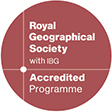
Geography BA
3-4 years
Geography is a discipline founded on understanding the complex links between Earth, its inhabitants, and the places they live. As a Human Geographer, you will learn to think critically and creatively about the world we live in and key challenges society faces for the coming century.
Start date:
Course information
Typical offer ABB
UCAS code L700
Institute code L34
Taught by School of Geography, Geology and the Environment

Accredited by the Royal Geographical Society (with IBG)

Ranked 1st in subjects aligned to Human Geography for ‘overall positivity’ in the NSS 2025 (according to Times Higher Education NSS 2024 methodology applied to the NSS 2025 data).

2nd in the UK for Geography (UniCompare, 2026)
Course description
Course description
This degree is perfect for you if you wish to experience the full breadth of Geography, but would like to specialise primarily in Human Geography. After a common first year with BSC students, in years two and three, we offer a diversity of optional Human Geography modules, covering topics like migration, environmental governance, climate change, gentrification, food security and geopolitics. There remain some Physical Geography module options in years two and three, so you can build your degree to become a generalist, or a specialist in Human Geography, depending on your interests. Throughout you can gain transferable skills in satellite remote sensing and geographical information science (GIS). If you decide at the end of year one that you want to specialise in Physical Geography, you can easily transfer to the Geography BSc degree.
Throughout your degree, there will be emphasis on critical thinking and the development of quantitative and qualitative research skills. We encourage our students to be critical and creative in their research approaches and methods. We use innovative teaching and assessment methods and encourage our students to reflect upon the role Human Geographers play in the modern world.
Entry requirements
Entry requirements
- A/AS-levels: ABB. Two AS-levels considered in place of one A-level. Geography not essential.
- EPQ with A-levels: BBB + EPQ at grade B.
- GCSE: Grade C/4 in English Language and Maths.
- Access to HE Diploma: Pass relevant diploma with a minimum of 45 credits at level 3, 30 of which must be at Distinction.
- BTEC Nationals: Pass Diploma with DDM.
- International Baccalaureate: Pass Diploma with 30 points. Must include a minimum of grade 4 in SL Maths or 3 at HL if 4/C not held at GCSE. Must include a minimum of grade 4 in English A or 5 in English B if minimum of grade 4/C not held in English Language at GCSE.
- T Levels: Distinction in Science (with an Occupational Specialism in Laboratory technician)
Other official national and international qualifications considered from across the world. You can review some of the qualifications we accept on our countries page and English Language equivalencies.
If your qualification or country is not listed, please contact us for more information, including the name and result of the qualification you have studied.
Second year entry may be possible with suitable qualifications.
Flexible entry requirements
We welcome applications from motivated students whose predicted grades are slightly below our standard entry requirements. We understand that predicted grades are not always an accurate reflection of your final results, and we’re happy to consider your application. Although we can’t guarantee an offer due to the high volume of applications, if you’re eligible, we may still offer you a place based on our standard requirements.
Contextual offers
The University of Leicester is committed to providing equitable opportunities for all applicants from all backgrounds. We make contextual offers to support students who may be impacted by the area they live in, their personal circumstances or who have completed one of our progression programmes. These offers are usually one or two grades lower than the standard entry requirements. To qualify for a contextual offer, you must apply for an eligible course and meet specific criteria – check if you’re eligible.
Selection process
When considering your application, we will look for evidence that you will be able to fulfil the objectives of the course and achieve the standards required. We will take into account a range of factors including previous exam results.
Applicants are not normally interviewed. If you receive an offer you will be invited to visit the School.
English Language Requirements
IELTS 6.5 or equivalent. If your first language is not English, you may need to provide evidence of your English language ability.
If you do not yet meet our requirements, our English Language Teaching Unit (ELTU) offers a range of courses to help you to improve your English to the necessary standard.
International Qualifications
Find your country in this list to check equivalent qualifications, scholarships and additional requirements.
Countries listFees and funding
Fees and funding
UK Students
Starting in 2026
- £9,790 in your first year, subject to Parliamentary approval.
- For the 2027/28 academic year, the Home UK tuition fee is expected to be £10,050, subject to Parliamentary approval. Further increases are anticipated to be implemented automatically through government legislation, therefore it is likely that your tuition fees will rise for each subsequent year of your studies.
Find out more about tuition fees, including year abroad, placement years, scholarships and funding.
International Students
Starting in 2026
- £20,750 per year
If you are resident outside the UK and the Republic of Ireland, you will need to pay a deposit to secure your place. This will be subtracted from your total tuition fee.
Find out more about tuition fees, including year abroad, placement years, scholarships and funding.
Careers and employability
Careers and employability
Geography and Environmental Scientists are highly competitive in the job market as their degrees furnish them with a range of highly sought-after skills. As well as studying topics that consider all of the major global challenges of the 21st century, our graduates are equipped with a range of subject specific and transferable skills (e.g. teamwork, communication, resilience, planning, problem solving).
Key statistics
- 97% of graduates in work or further study after 15 months
- Average salary 10 years after graduation is £40,100
- Recent employers include: Environment Agency, Yorkshire Water, Aon, National Library of Scotland, KPMG, NHS, Cabinet Office, Department of Work and Pensions, HSBC
Supported by the University’s Careers and Employability Service, employability is embedded in all of our curricula from year one:
- The Leicester Award for Employability personal development programme is embedded in core year one and year two modules, providing students with opportunities to reflect on their motivations, personality traits, transferable skills, and future career goals
- All students have lifetime access to and support from our award-winning Careers and Employability Service.
- The year two Geography in Education module provides specific work experience within local schools, ideal for students interested in teaching or working with young people in their future careers
- We have a dedicated School Careers Tutor who works with the Careers and Employability to support careers fairs, disseminate job opportunities and career development courses, and to provide practical information.
- We run a School-wide annual careers day; recent speakers have included the Civil Service, Selfridges & Co, Hatch Regeneris, the Leicestershire and Rutland Wildlife Trust, the Environment Agency, Ordnance Survey and the Centre for Ecology and Hydrology.
- All of our degrees allow include a four year “with a Year in Industry” option, where the third year of the degree is spent on a work placement.
The School has established links with many businesses and Government departments, including Natural England, the European Space Agency, the Home Office and the Joint Research Centre of the European Commission.
Case studies

Megan Hudson (BSc Geography) is now a General Manager at Fenland SOIL; a farmer-led, multi-stakeholder research organisation that aims to mitigate greenhouse gas emissions from lowland agriculture. Her work involves a wide range of activities, spanning finance and marketing, meeting and day to day work with growers and stakeholders, through to working on research projects with universities and organisations like Natural England.
 Momin Ashraf (BA Geography) is a member of the GIS intelligence team at the Satellite Applications Catapult in Didcot. His work is focused on international development and humanitarian aid. He uses satellite and spatial data to monitor issues such as water security, internally displaced people and conflict zones. His skills and interests in GIS allowed him to work in a range of industries during his year in industry, and it was his GIS, Remote Sensing and Information Visualisation courses that provided the key skills shaping his career (skills in critical industry-standards such as QGIS, ArcGIS, Tableau, SQL, Python).
Momin Ashraf (BA Geography) is a member of the GIS intelligence team at the Satellite Applications Catapult in Didcot. His work is focused on international development and humanitarian aid. He uses satellite and spatial data to monitor issues such as water security, internally displaced people and conflict zones. His skills and interests in GIS allowed him to work in a range of industries during his year in industry, and it was his GIS, Remote Sensing and Information Visualisation courses that provided the key skills shaping his career (skills in critical industry-standards such as QGIS, ArcGIS, Tableau, SQL, Python).
 Tara Ahmad (BA Human Geography) joined the Lidl UK Graduate Programme. Tara had a particular interest in economic geography and during her BA Human Geography degree she particularly enjoyed the Economy Society and Space module, which focuses on the commoditisation of foodstuffs. During her second and final years she was a course representative and a co-chair of the student-staff committee. This meant lots of scope to present, collaborate and share her work, providing the confidence to move forward into her future career.
Tara Ahmad (BA Human Geography) joined the Lidl UK Graduate Programme. Tara had a particular interest in economic geography and during her BA Human Geography degree she particularly enjoyed the Economy Society and Space module, which focuses on the commoditisation of foodstuffs. During her second and final years she was a course representative and a co-chair of the student-staff committee. This meant lots of scope to present, collaborate and share her work, providing the confidence to move forward into her future career.
Careers and Employability Service
Get career-ready at Leicester with guidance from our award-winning Careers and Employability Service. We're here to give you a lifetime offer of support, even after graduation. Our team of specialist careers advisers and mentors will help you every step of the way. From supporting you with CVs and interviews, to volunteering opportunities and placements, we’re here to help you reach your professional goals.
Related courses
Related courses
Sustainable Development Goals
Sustainable Development Goals
We are committed to providing skills and knowledge to help prepare you tackle global challenges. We have mapped our undergraduate degrees for learning which aligns to the 17 UN Sustainable Development Goals.
This degree includes learning which relates to the following UN Sustainable Development Goals:
- Goal 4: Quality education
- Goal 8: Decent work and economic growth
- Goal 10: Reduced inequalities
- Goal 11: Sustainable cities and communities
- Goal 12: Responsible consumption and production
- Goal 13: Climate action
- Goal 15: Life on land
Course structure
Year 1
Year 1
You will study a broad range of physical and human geography topics in order to understand, and build a foundation in, the breadth of the discipline. A UK-based residential field trip will get you out of the lecture theatre and into the field where you will develop fieldwork skills and work as a team to complete project work.
Modules
- Human Geography for a Globalised World
- Skills for Professional Geographers
- The Digital World
- Evolution of the Earth System
- Environment/Nature/Society
- Human Geography Fieldcourse: The dynamics of people and place
- Working with Geographical Information
- The Contemporary Earth System
Apart from the field module, the course material in year one is the same as BSc in Geography. This enables you to switch between the two degrees at the end of your first year, should you wish.
The modules listed reflect those currently available to students. Every year, we review our modules and their content to ensure that our courses maintain the best academic and student experience possible. Whilst this does mean elements of your course may change in future academic years, it ensures your course is giving you a research-inspired education and preparing you for your future.
Year 2
Year 2
During this year you will begin to focus on the human aspects of geography, covering topics such as environmental justice, gentrification, and the politics of development. Your second year will involve an international field trip (previous locations have included New York and Vancouver ). A physical Geography option remains and you will take the interdisciplinary Climate Change module in semester one.
Core modules
- Histories and Philosophies of Human Geography
- Climate Change: Impacts, Vulnerability and Adaptation
- Research Design and Methods (with Dissertation Planning)
- Geographical Research in the Field (Human Geography Overseas Field Course)
- Geographical Information Science
Option modules
Choose two option modules from:
- Critical Geographies of Environment and Development
- Economy, Society and Space
- Social and Cultural Geography
- The Dynamic Biosphere
Then choose one option module from:
The modules listed reflect those currently available to students. Every year, we review our modules and their content to ensure that our courses maintain the best academic and student experience possible. Whilst this does mean elements of your course may change in future academic years, it ensures your course is giving you a research-inspired education and preparing you for your future.
Year Abroad or in Industry (optional)
Year Abroad or in Industry (optional)
If you want to, you can spend the third year of the BA studying abroad at one of our partner institutions or working in an industrial placement. Alternatively, you can opt to continue studying at the University and complete your degree in three years.
Year Abroad
We’ll make sure you have everything you need for your future career: not just by awarding you a high quality degree, but also by helping you to develop the skills, knowledge and confidence you need to make your mark in the world as a Citizen of Change. One way you can do this is by opting to take a Year Abroad between Years 2 and 3 of your degree.
Studying abroad is not just for people who are interested in travelling and meeting new people. It is about acquiring life skills that are becoming increasingly significant for a wide range of jobs in our modern globalised society. Whether you go on to a career in the private, public or third sector - or plough your own furrow as an entrepreneur – you will find the experience invaluable.
For more information, including a list of destinations, please visit our Study Abroad website.
Please note
- A year spent abroad still incurs a tuition fee, but this is much lower than for a normal year at Leicester. See the Fees and Funding tab of this page for details.
- You may be eligible for a travel grant from Student Finance England.
- Places are offered on a competitive basis, and eligibility is dependent on your academic performance in Years 1 and 2.
- Language courses, at beginners or advanced level, are available through our Languages at Leicester scheme.
Year in Industry
A Year in Industry gives you the opportunity to stand out from the crowd when it comes to applying for graduate jobs with work experience incorporated into your programme of study. If this is for you, in Year 2 you will take a module in which we prepare you for that year in work and support you with your search for a placement in an industry or organisation relevant to your career aspirations. After your Year in Industry you will return to University for your final year of study.
A year in industry still incurs a tuition fee, but this is much lower than for a normal year at Leicester. See the Fees and Funding tab of this page for details.
The modules listed reflect those currently available to students. Every year, we review our modules and their content to ensure that our courses maintain the best academic and student experience possible. Whilst this does mean elements of your course may change in future academic years, it ensures your course is giving you a research-inspired education and preparing you for your future.
Final Year
Final Year
Your final year incorporates a blend of teaching and independent research. You will select a topic to research in your dissertation and choose from a wide range of research-led optional modules. Here you may chose to focus on particular themes of interest, or select from a wide range of topics to be more of a generalist.
Core modules
Option modules
Choose two option modules from:
- Contemporary Environmental Challenges
- Critical, Symbolic and Emotional Rural Geographies
- Critical Digital Geographies
- Neotropical Rainforests
- Sustainability Enterprise Partnership Project
Then choose four option modules from:
- Cities of the Global South
- Migration, Place and Diversity
- Geographies of Health and Wellbeing
- Overseas Field Option
- Information Visualisation
- Research Communication
- Remote Sensing of the Environment
The modules listed reflect those currently available to students. Every year, we review our modules and their content to ensure that our courses maintain the best academic and student experience possible. Whilst this does mean elements of your course may change in future academic years, it ensures your course is giving you a research-inspired education and preparing you for your future.
Fieldwork
Fieldwork
Field trips run during each year of study. In year one, residential fieldwork studies Sheffield's fascinating environmental and industrial heritage, via urban exploration and training in creative visual methods.
In your second year, residential field training in Copenhagen examines topics like multiculturalism, gentrification and migration. This week-long residential includes a variety of day trips that interrogate the composition and evolution of global cities.
Our final year optional fieldtrip takes students to Berlin to consider geopolitics and how Berlin’s (and Germany’s) geopolitical history continue to shape the geography of the city. The module is an opportunity to apply critical and creative geographic research approaches.
All of our core (years one and two) field course costs are largely subsidised by the University of Leicester and we ask only for annual contributions of £100 in year one and £250 in year two. Optional third year field courses do come with additional costs, although there are bursaries available.
Fieldwork locations may vary and are subject to availability.
And you’ll be pleased to know our staff are involved in field-based research worldwide, ensuring that our teaching draws on active field experience.
Fieldwork locations may vary and are subject to availability.
Fieldwork locations may vary and are subject to availability.
The modules listed reflect those currently available to students. Every year, we review our modules and their content to ensure that our courses maintain the best academic and student experience possible. Whilst this does mean elements of your course may change in future academic years, it ensures your course is giving you a research-inspired education and preparing you for your future.
Why Leicester?
You will definitely want to join the Students' Union's Geography Society which offers a great mix of academic support and social events. Leicester GeogSoc is affiliated to EGEA, a massive European network providing great opportunities for exchanges and professional development.
Fieldwork is integral to all of our degrees. Our field trips will take you to some of the world's most remarkable environments, such as Copenhagen and Berlin.
Our outstanding teaching and student support is reflected in our NSS 2025 results. We were ranked 2nd in subjects aligned to Human Geography for ‘Student Voice’ , ‘Learning Opportunities’ and ‘Teaching on my Course’ in the NSS 2025 (according to Times Higher Education NSS 2024 methodology applied to the NSS 2025 data).
Teaching and learning
Teaching
You will be taught through a mixture of lectures, tutorials, seminars, practicals and fieldwork. All lecture material is available online through our virtual learning environment Blackboard. Contact time typically averages about 11-13 hours per week. Residential field trips are run by academic staff throughout the degree and provide extended periods of small group teaching in field contexts.
Assessment
Your work will be assessed through a mixture of methods including, essays, learning diaries, oral and poster presentations, mock journal articles, popular science articles and a final year individual (supervised) dissertation project. Coursework is mainly undertaken on an individual basis. However, a number of modules (especially field-based modules) involve assessed group project work.
Your contact hours will depend on the option modules you select. You can see details of the contact hours on individual module pages.
Independent learning
When not attending lectures, seminars or other timetabled sessions you will be expected to continue learning independently through self-study. Typically, this will involve reading journal articles and books, working on individual and group projects, undertaking research in the library, preparing coursework assignments and presentations, and preparing for exams. To help with your independent learning, you can access the Library and our social study spaces in halls of residence.
Academic support
Our Centre for Academic Achievement provides help in the following areas:
- study and exam skills
- academic writing
- presentations
- dissertations
- numerical data skills
- referencing sources
Our AccessAbility Centre offers support and practical help for students with dyslexia or other specific learning difficulties, including physical, mental health or mobility difficulties, deafness, or visual impairment.
Teaching staff
This is a research-led degree. You will be taught by an internationally recognised experts in their fields, whose expertise and knowledge are closely matched to the content of the modules on the course. Our third year specialism modules map closely to staff’s current research and to our cutting edge facilities where you will get hands on experience. PhD research students who have undertaken teacher training may also contribute to the teaching of seminars under the supervision of the module leader. Our teaching is informed by the research we do. You can learn more about our staff by visiting our staff profiles.
Apply now
| Course | Qualification | Duration | UCAS Code | Availability |
|---|---|---|---|---|
| Course Geography | Qualification BA | Duration 3 years full-time | UCAS Code L700 | Availability How to apply |
| Course Geography with Year Abroad | Qualification BA | Duration 4 years full-time | UCAS Code L700 | Availability How to apply |
| Course Geography with a Year in Industry | Qualification BA | Duration 4 years full-time | UCAS Code L700 | Availability How to apply |
Data about this course

Studying at the University of Leicester has allowed me to go to some amazing places! Getting the chance to actually visit the places we were studying made the course so much more engaging and exciting.




